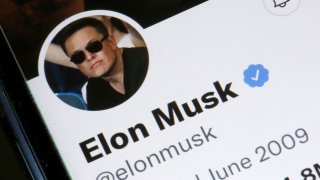
This is an excerpt from the CNBC Make It newsletter. Subscribe here.
Elon Musk has finally acquired Twitter after a weekslong saga during which he first became the company's largest shareholder, then offered to buy it outright.
The world's richest person secured a deal on Monday, agreeing to buy the social network for $54.20 a share — valuing the firm at roughly $44 billion.
What comes next for Twitter is anyone's guess. Over the past few weeks, Musk has hinted at changes he would like to see the platform make, but has stopped short of laying out a road map for the direction he wants to take Twitter.
Get top local stories in Connecticut delivered to you every morning. >Sign up for NBC Connecticut's News Headlines newsletter.
In a statement released after the deal was reached, Musk called Twitter "the digital town square where matters vital to the future of humanity are debated" and said he looks forward to tapping into the company's "tremendous potential."
Here's what to know about Musk's plans for Twitter.
Twitter is likely going private
Money Report
Musk has said that part of the reason he wanted to acquire Twitter is because, in his view, the changes that need to be made to the platform can only be done if it's a private company.
It's a sentiment that Musk shares with Twitter co-founder and ex-CEO Jack Dorsey, who tweeted on Monday that the company "has been owned by Wall Street and the ad model." Dorsey said that going private "is the correct first step."
Though Twitter's board unanimously approved the sale, the deal will still need to be approved by shareholders and be subject to a regulatory review. CEO Parag Agrawal said he expects the deal will close in the next three to six months.
"Shareholders are going to have to look at whether or not they think this is the best deal they can get with Twitter or whether they can do better without Musk," Eleanor Bloxham, CEO of corporate advisory firm The Value Alliance, tells CNBC Make It.
If they accept Musk's buyout offer, they will be able to sell their shares for $54.20 each. Shareholders can also hold onto them until the day the company goes private, at which point they will be cashed out at the current trading price.
Musk wants major changes
Musk has framed his pursuit of Twitter as one necessary to preserve "free speech." Although he hasn't said specifically what he wants to change, he has been critical of Twitter in the past, suggesting that the platform stifles free speech and engages in "censorship."
Over the past few weeks, he has indicated that he would loosen Twitter's content moderation policies and pull back on efforts to rid the platform of bad actors who violate the service's guidelines. Musk has also said that he hopes his ownership of Twitter doesn't cause anyone to leave.
"I hope that even my worst critics remain on Twitter," he tweeted Monday. "Because that is what free speech means."
But content moderation isn't Musk's only area of interest. Here's what else he has said he wants to change about Twitter.
- He has called for the addition of an edit button, which Twitter says is currently in the works.
- He wants users who subscribe to Twitter Blue to be able to pay with his favorite cryptocurrency: dogecoin.
- He says that Twitter should make its algorithm — which determines which posts are shown to which users — open source so as to "increase trust" in the platform.
- He says that Twitter should eliminate the spam bots that plague its platform "or die trying," and will "authenticate all real humans" with a verification badge of some sort.
No layoffs, for now
Make It broke down the impact that the acquisition will have on Twitter's 7,000 employees. Agrawal said during a company-wide town hall heard by Reuters that there are no layoffs currently planned, but "once the deal closes, we don't know which direction the platform will go."
It seems like the only certainty for Twitter is uncertainty.
"Twitter has never seen the level of volatility in the past that they are likely to see going forward," Bloxham says. "I think maybe [Twitter employees] should prepare their resumes if they can't stomach that."
Sign up now: Get smarter about your money and career with our weekly newsletter
Don't miss: Kevin O'Leary's No. 1 money mistake to avoid during periods of high inflation






